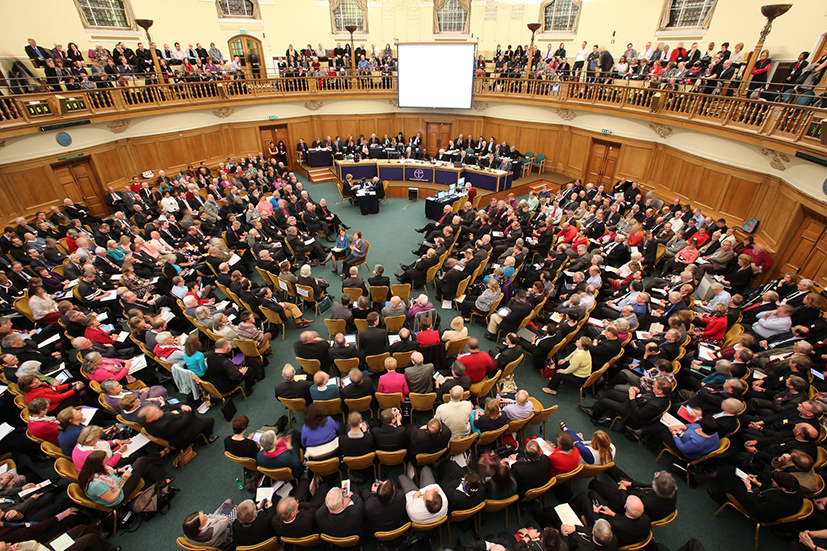I have hesitated to write or speak about the upcoming Synod on Synodality for several reasons. First, I really do try to be open minded and give projects and people the benefit of the doubt. The Synod on Synodality is proposed. Let’s not jump to conclusions. Let’s give it a fair hearing. Let’s try to be positive and open to the Holy Spirit.
So, with this in mind, Let’s affirm that the Holy Spirit is alive in the Church and that Christ promised that the Holy Spirit would lead us into all truth. Let’s also affirm that over the centuries the Christian faith has developed and adapted. St John Henry Newman outlined the principles by which we can accurately assess the development of Doctrine in his famous essay of that title. Let’s also affirm not only that doctrine does develop, but that it must develop and that it is often cultural and ecclesial circumstances that enable it to develop.
While we say “doctrine develops” it is more accurate to say that our understanding and perception of doctrine develops. The doctrine doesn’t change, but our understanding deepens and broadens. An example is “There is no salvation outside the church” This was once understood to mean “All non-Catholics are damned to hell”. We now understand that the Body of Christ is wider than the boundaries of the Roman Catholic Church. Those who have faith in Christ and are baptized may also share in the saving grace won by Christ’s redemption. They are also members of the Church although separated from full communion and therefore may also be saved. This does not negate the statement “No salvation outside the church” Instead it broadens and clarifies our understanding of the statement.
Might we expect similar clarifications from the synodal process? I don’t know. We’ll see what happens.
Despite my wait and see attitude about the synod on synodality I do have some basic misgivings. I apologize. I am, by nature and upbringing conservative. Therefore I am wary of change. I like old stuff. I value tradition. My misgivings about the synod are gut-level and I may be wrong about them, but those who are gung ho about the synod on synodality might do well to listen to these misgivings with the same open mindedness and willingness to give the benefit of the doubt that I am willing to give them.
First I have questions about the intent of the synod on synodality. What exactly is the point? Why is this needed? I hear much talk about “Reform” but the present regime in the Vatican has not, so far, been stunningly successful in producing the much promised reform. The sexual immorality and cover up problems at the highest level have not been solved. Financial mis-management and corruption have not disappeared. The radical German bishops have not been reined in. Reform? What reform? Does anyone imagine that a synod will accomplish what no one else has been able to get done?
But perhaps I misunderstand what “Church Reform” really means. Clearly I do. This makes me even more wary. If Reform is not what I thought it was, then what DO the proponents of the synod mean by Reform? They can only mean reform not of existing structures of discipline and their application, but reform of something else, and what might that something else be? Is it a change in doctrine or disciplines of the church or it more fundamental– a reform of the basic way the church works? Does it mean moving from an episcopal and clerical power structure to a “synodal” one–with “synodal” being a code word for a parliamentary or democratic form of church governance?
If this is the case, in a spirit of ecumenism, we should study what fruit this process has produced in the experience of our ecumenical partners. I was a priest in the Church of England for fifteen years and I can testify that the synodal system (with its accompanying lowest common denominator and majority rules mentality) not only allowed the Church of England to drift away from historic Christian morality, but it also brought about a drift from Biblical and traditional Christian doctrine. In addition to the widespread apostasy now prevalent in the Church of England, the synodal system–in an attempt to give the people a voice– was based on elected officials. This led to electioneering and lobbying. Across the church from parish level through to deanery, diocesan and the national level elections were held for places on the synod and this led to campaigns (and election campaigns require funding) lobbying, personal attacks, mud slinging and everything that goes with the pursuit of power.
But what else about the Catholic Church needs to change? When you look at the hand picked members of synod it shouldn’t be difficult to discern what changes they would like to put in place. No matter whether you agree with their agenda or not, do we really want to submit the Catholic Church to the worldly, ideologically driven agenda of some of the selected participants? Is that true synodality or is it an example of the very ultramontanism and clericalism the proponents of synodality say they decry?
These are my misgivings, but finally, what troubles me most is a trend I see developing in which those who are enthusiastic about the synod dismiss anyone who might just have some genuine reservations with the accusation, “If you disagree with me you are disagreeing with the Holy Spirit!” In other words, “If you disagree with me you disagree with God.” In other words, “I and my pals are in direct communication with God. Get on board or else!”
I have been blessed in my life to have had a variety of religious experiences from fundamentalist Protestantism through Anglicanism to the Catholic Church and I have heard all this before. First it was the fundamentalist preachers who would shake their big Bible in the air and yell, “Young people, if you disagree with me you disagree with God’s Word! You’d better get on board. Shape up or ship out.” Then it was the Anglican advocates of women’s ordination saying in their urbane and polite English way, “You know, the Holy Spirit really is leading the church to ordain women. This is new wine. The old wineskins must be broken. You should prayerfully consider voting for this!” Uh huh. And if you don’t you’re outta here mate.
This kind of “The Holy Spirit is on my side and it’s my way or the highway” mentality does not lead to unity. It leads to forced uniformity. It always leads not to unity, but to division. It always leads to violence–if not physical, then spiritual, emotional and mental violence.
So you’ll forgive me if, when it comes to the synod on synodality, if I hesitate.







Leave A Comment
You must be logged in to post a comment.